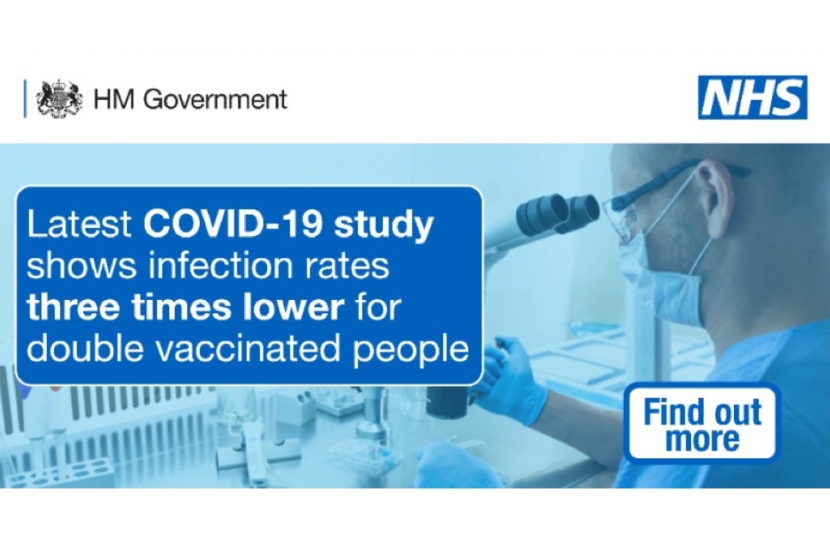
Today, interim findings from one of the UK’s largest studies into COVID-19 infections in England have shown that COVID-19 infection rates are three times lower for double vaccinated people – showing that it is vital to get a life-saving second jab so we can get back to our everyday lives.
Vaccines are our route out of the pandemic – we already know that vaccinated people are less likely to get COVID-19 symptoms, be admitted to hospital or die, and there is growing evidence that vaccinated people are less likely to pass the virus on to others.
In another step forwards, interim findings from the latest report of REACT-1, one of the country’s largest studies into COVID-19 infections in England, have shown that infection rates for double vaccinated under-65s are three times lower than in unvaccinated under-65s, meaning that our vaccine rollout is having a significant impact on stopping the spread of the virus.
This report is the latest from the REACT-1 study which was commissioned by the Department of Health and Social Care and carried out by a world-class team of scientists, clinicians and researchers at Imperial College London, Imperial College Healthcare NHS Trust and Ipsos MORI. Robust population surveillance studies like this are essential to understanding the rate of COVID-19 infection, how the virus is spreading across the country and the impact of measures taken to contain the virus in order to inform current and future actions.
The latest data from Public Health England (PHE) shows that our vaccination programme has saved over 27,000 lives and has prevented over 7 million people from getting COVID-19. It also shows that both doses of a COVID-19 vaccine can reduce symptomatic infection by almost 80%.
All those aged 18 and over can book their vaccination through the NHS booking service, and second doses are being accelerated by reducing the dosing interval from 12 weeks to 8 weeks.
It is vital that everyone gets their second life-saving jab so we can continue to weaken the link between cases, hospitalisations, and deaths, and build a wall of defence against the virus and return to our everyday lives.
For more information on the latest REACT-1 study findings, including an in-depth description of the main findings from the first half of the thirteenth round of the REACT-1 study and comments from the Health and Social Care Secretary and the COVID-19 Vaccine Deployment Minister, please visit: https://www.gov.uk/government/news/latest-react-1-study-findings-show-covid-19-infection-rates-three-times-lower-for-double-vaccinated-people.
International travel update: Amber list quarantine for fully vaccinated to end on 19 July
Fully vaccinated UK residents arriving in England from amber travel list destinations will no longer have to quarantine from 19 July. They will, however, still need to pay for PCR tests before and after their return, the Transport Secretary has confirmed. Under-18s returning from amber list places would also be exempt from quarantine.
Currently, anyone returning from amber or red list countries must isolate for 10 days, regardless of vaccine status. The Transport Secretary added that:
"To be clear, a full vaccination means 14 days have passed since your final dose of the vaccine.
"In essence, this means that for fully vaccinated travellers the requirements for green and amber list countries are the same."
The Transport Secretary has also confirmed that from 19 July - which is also the day when most COVID rules in England are due to end - the guidance that people should not travel to amber list countries will be removed. However, he cautioned "an amber list country could still turn red", meaning hotel quarantine would become a requirement.
All of England's 19 July rule changes are due to be confirmed on 12 July after a review of the latest data.
